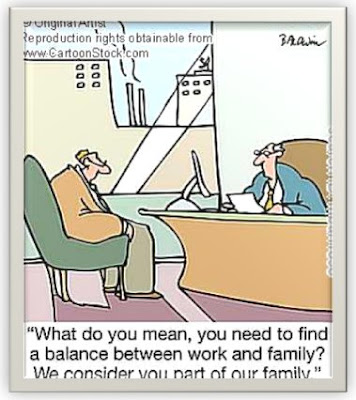Figure 1.
Figure 2.
 Figure 3.
Figure 3.
Through these cartoon pictures, an important fact is being pointed out. For some persons, work is so important that it dominates their life. Unfortunately such priority given to their job, make them forget that they have a family and that spending time with their wife/husband and children might be more beneficial than earning a lot of money. As shown in the first cartoon, a balance between the family and work must be found. Some employers also tend to forget that the workers might have a family at home waiting for them. As mentioned in the second picture, some people completely forget their private life and this may make the job extremely tedious and boring. The importance of realizing such a fact before it is too late is highlighted in the third cartoon.
This video reflects the difficult and unfair lifestyles workers had before in the past like low wages and very bad working conditions. As they state themselves, they worked very hard to get some rights. Even though they talk about a specific country; Australia, many other people from all over the world passed through similar experiences. Listening to individuals talking about their own personal experience would make us more aware of how fortunate we are now-a-days that things have changed. Unfortunately there are other people who are still suffering a lot to earn a living.
In this clip, one can understand better how it feels to be maltreated and that no rights are put in practice. These domestic workers show us the reality that many workers till the present day are getting tormented to be able to fulfill their basic human needs like eating. Raising awareness of such conditions may help improve the condition worldwide.
In this clip, one can understand better how it feels to be maltreated and that no rights are put in practice. These domestic workers show us the reality that many workers till the present day are getting tormented to be able to fulfill their basic human needs like eating. Raising awareness of such conditions may help improve the condition worldwide.


